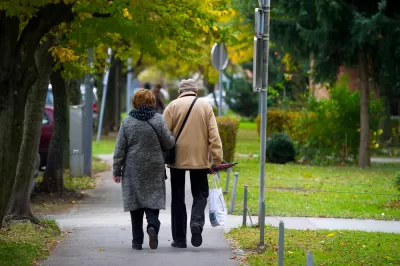With a high number of elderly residents, the London suburb of Purley has taken steps to become "dementia-friendly." There's no single definition of what that means, but community awareness and education are a focus.

Taking inspiration from age-friendly cities in Japan, communities in the UK are seeking to be more "dementia-friendly." Peter Watts writes, "The Alzheimer’s Society has designated 220 communities in England and Wales as dementia-friendly, aiming to reduce stigma around the disorder and improve safety and quality of life for those who experience it. The charity is campaigning for London to be the world’s first 'dementia-friendly capital city' by 2020."
Unlike "age-friendly," which often takes a higher policy view, "Dementia friendly is a much more specific lens, it's grassroots and very localised, usually focused around a high street. It's also more focused on training – getting people to understand needs.”
In places like Purley, local activists and service providers need to take the lead. "It's then down to community groups to contact a body like the Dementia Action Alliance, an umbrella organisation consisting of 150 groups working in the field, who can offer advice. This is an intensely localised concept, created so each community is able to adapt to specific needs."
"In the London borough of Lewisham, for instance, there has been a drive to persuade museums and arts venues to offer dementia-friendly activities, as well as working with shops, supermarkets and banks to provide slow lanes and special assistance."
FULL STORY: Forget-me-nots in Purley: how the town became 'dementia friendly'

Maui's Vacation Rental Debate Turns Ugly
Verbal attacks, misinformation campaigns and fistfights plague a high-stakes debate to convert thousands of vacation rentals into long-term housing.

Planetizen Federal Action Tracker
A weekly monitor of how Trump’s orders and actions are impacting planners and planning in America.

In Urban Planning, AI Prompting Could be the New Design Thinking
Creativity has long been key to great urban design. What if we see AI as our new creative partner?

Pedestrian Deaths Drop, Remain Twice as High as in 2009
Fatalities declined by 4 percent in 2024, but the U.S. is still nowhere close to ‘Vision Zero.’

King County Supportive Housing Program Offers Hope for Unhoused Residents
The county is taking a ‘Housing First’ approach that prioritizes getting people into housing, then offering wraparound supportive services.

Researchers Use AI to Get Clearer Picture of US Housing
Analysts are using artificial intelligence to supercharge their research by allowing them to comb through data faster. Though these AI tools can be error prone, they save time and housing researchers are optimistic about the future.
Urban Design for Planners 1: Software Tools
This six-course series explores essential urban design concepts using open source software and equips planners with the tools they need to participate fully in the urban design process.
Planning for Universal Design
Learn the tools for implementing Universal Design in planning regulations.
planning NEXT
Appalachian Highlands Housing Partners
Mpact (founded as Rail~Volution)
City of Camden Redevelopment Agency
City of Astoria
City of Portland
City of Laramie



























